Review: Stages' OTHELLO: THE REMIX Brings New Energy and Life to Shakespeare in Houston
Runs Through June 9th; Buy Your Tickets Now Before It Closes!
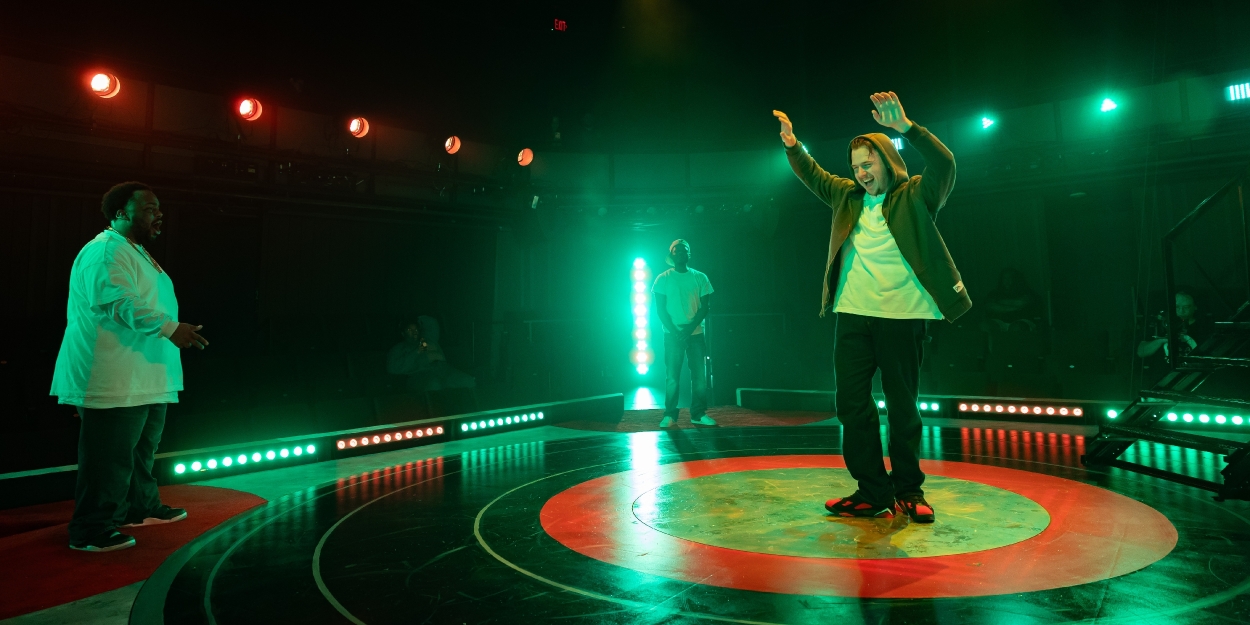
In Q Brothers’ Othello: The Remix, William Shakespeare’s 1622 Othello is rewritten as songs and raps over electric beats that reimagine, invigorate, and energize the original piece of theatre. All of the characters are the same as the ones in the classic plot, but we are set in a new time and place. The characters in Othello: The Remix are successful hip-hop musicians rather than military men, and the show is fast-paced, telling the multi-hour tale of Othello in an impressive hour and a half. Additionally, this show is ultimately a hip-hop opera of sorts as there is no time given to straight theatrical scenes, similar to the well-known and critically acclaimed Hamilton. A New York Times Critics’ Pick, Othello: The Remix has a catalog of platinum accolades and press, even being premiered at London’s Globe Theatre.
The Q Brothers–who are the writers of this upbeat theatrical work–are award-winning and internationally acclaimed theatre artists. They have been creating original work fusing hip hop and theater as well as adapting classic stories to modern pieces for today’s audiences for over two decades. The Q Brothers conceived the term add-RAP-tation in 1999 with their Off-Broadway hit “The Bomb-itty of Errors” (yes, based on another Shakespeare classic, The Comedy of Errors).
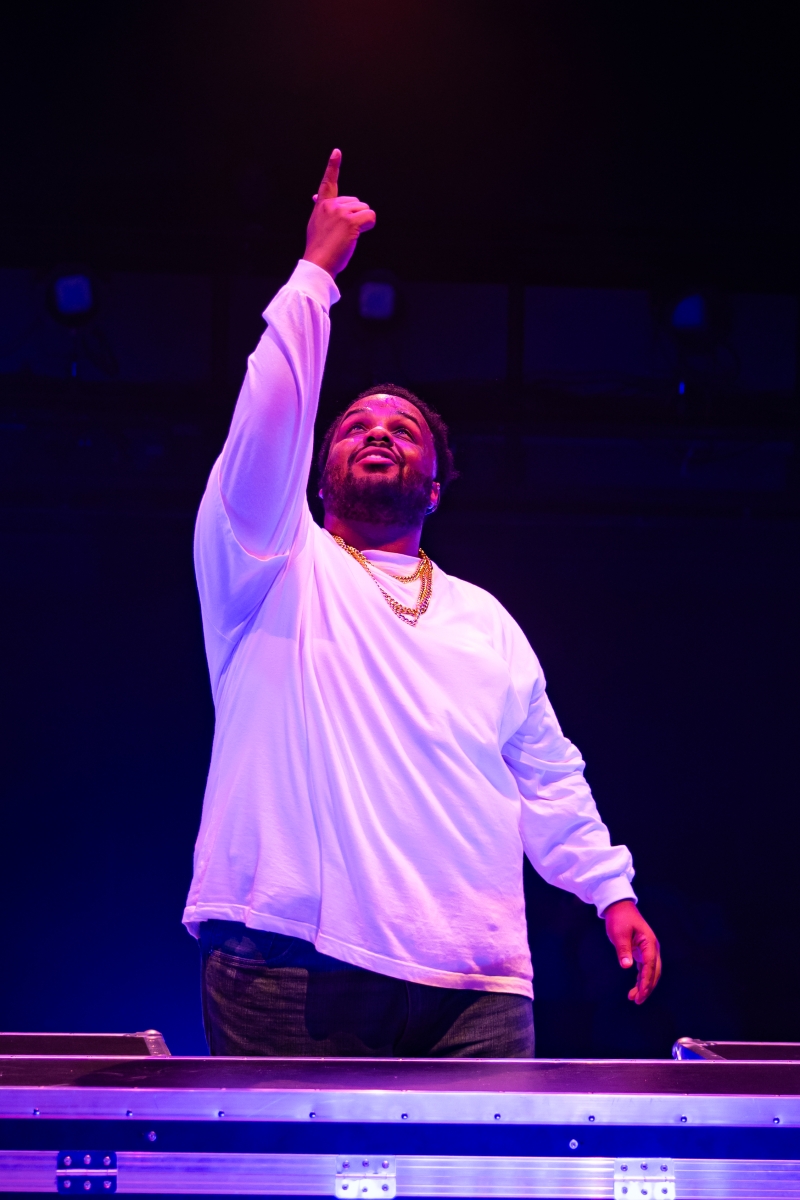
in Stages' Othello: The Remix
Photograph by Melissa Taylor
In Othello: The Remix, the numerous characters of the show are played only by four male actors. Othello–played by the talented and captivating actor Camryn Nunley–is a hip-hop star, a gifted rapper, and a self-made entrepreneur who makes it big after growing up in a tough, poor neighborhood. Soon into the show, we are introduced to the woman he falls in love with: Desdemona. In this show, Desdemona is a disembodied voice, brought to life only by powerful and beautiful riffing partnered with a spotlight that shines down onto center stage. She is characterized to be a powerful soul singer, and her musical hooks help to elevate Othello's sound from hardcore rap to mainstream hits.
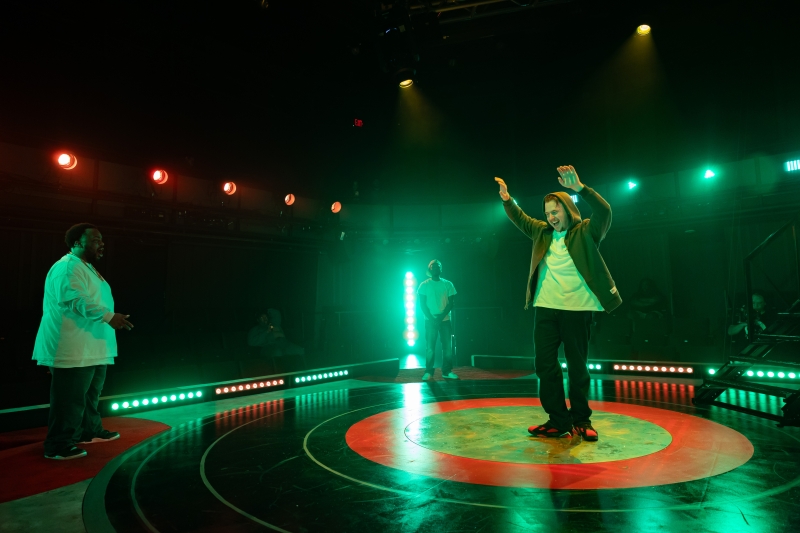
Camryn Nunley as Othello,
Kory Laquess Pullam as Cassio,
and Gabriel Mullen as Iago
in Stages' Othello: The Remix
Photograph by Melissa Taylor
Iago–an underground rapper who has been in Othello's crew since its inception–is jealous of Othello’s success. Iago is brought to the stage by Gabriel Mullen, who adds just the right amount of slinkiness and evil to the character, even getting the audience to boo at him at multiple points in the performance. Iago is the best lyricist of the group, and he is a hip-hop purist who is disgusted by the way rap is turning into mainstream pop music. He wants to take Othello down, just like in the original Shakespearean script. In addition to Iago, Mullen also plays Brabantio, Desdemona's father, who is a stuffy and conservative Senator; he does not approve of her relationship with Othello. Mullen does a wonderful job differentiating his multiple roles, making it look easy.
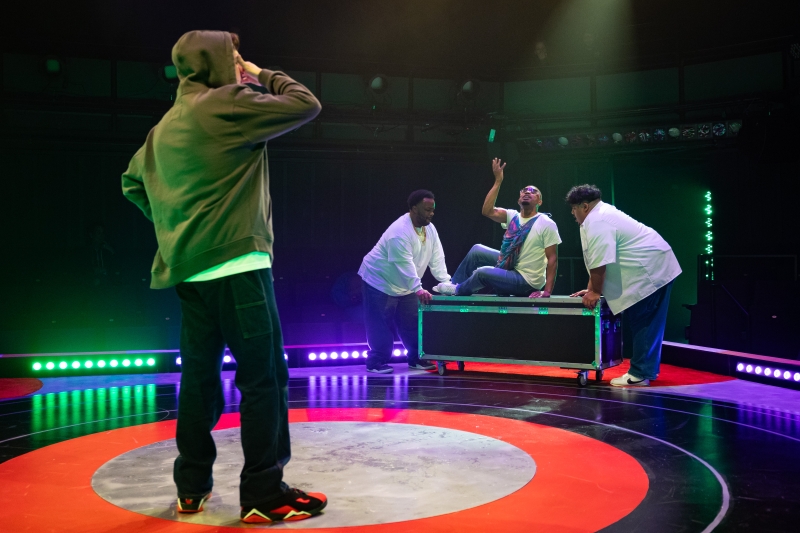
Gabriel Mullen as Iago,
Camryn Nunley helping set the scene,
Kory Laquess Pullam as Emilia,
and Issac Lopez as another supporting character
in Stages' Othello: The Remix
Photograph by Melissa Taylor
Emilia is Iago's wife and a close friend of Desdemona’s. She is always trying to get Iago's affection and attention by flaunting her body and offering sexual favors, but to no avail. She is supportive of Iago’s career, but she only receives verbal abuse from him in return. She is played by Kory Laquess Pullam, who also acts as Cassio.
Cassio is the newest member of Othello's crew. He is a captivating dancer with a lot of fun and spunk. Pullam was just perfect for this role; I could not imagine Cassio being played better by anyone else! Cassio is a great dancer who raps about grooving and flirting with his groupies, even though he only has eyes for Bianca, his girlfriend. We quickly learn that he only speaks a big game for his rap star image, but that quickly backfires on him when Iago begins his master plan against Othello.
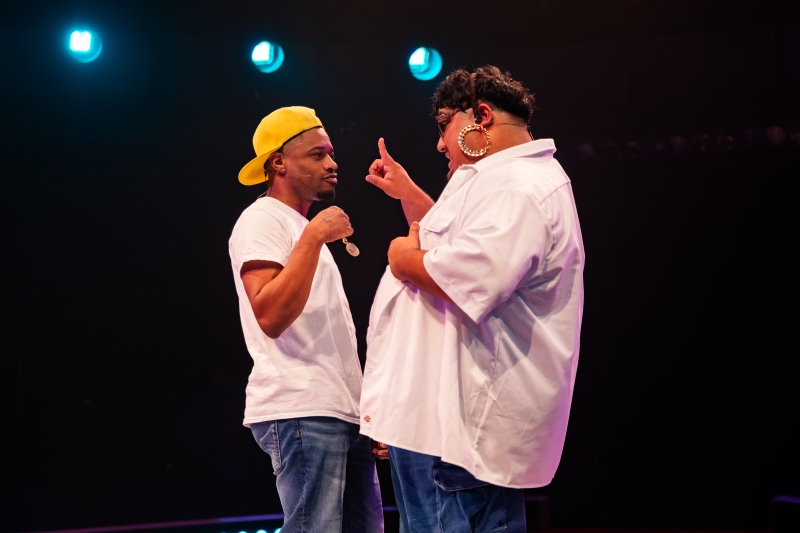
Kory Laquess Pullam as Cassio
and Issac Lopez as Bianca
in Stages' Othello: The Remix
Photograph by Melissa Taylor
Bianca follows Cassio everywhere the crew tours. She's fiery, feisty, and she knows what she wants, which is nothing but Cassio. She is played by the same man who also brings to life Roderigo and Loco Vito (the head of First Folio Records, the label to which Othello and his crew are signed). The actor who masterfully brings these roles to life is Issac Lopez. Lopez is downright hilarious, and the way that he played so many roles so effectively was incredibly impressive.
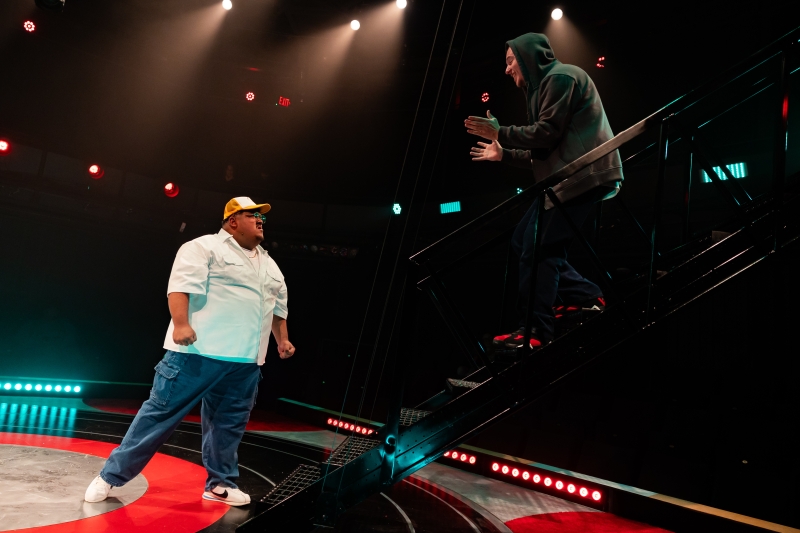
Issac Lopez as Roderigo
and Gabriel Mullen as Iago
in Stages' Othello: The Remix
Photograph by Melissa Taylor
Roderigo is a nerdy lighting technician who travels with the crew on tour. He is secretly in love with Desdemona, who does not even know he exists. He loves sci-fi, fantasy movies/books, and video games, and he speaks with a lisp. I found the “nerd” stereotyping in this role to be a bit too strong at times, but the audience really enjoyed the comedy of the awkwardness presented through this character.
There are also many other small characters that the four actors play throughout the show, including being the backup crew for each other at various moments within the musical.
In the show, Iago plots Othello’s downfall by falsely implicating Desdemona and Cassio in a love affair. With the unwitting aid of Emilia and the willing help of Roderigo, Iago carries out his plan. Making use of a necklace belonging to Desdemona and found by Emilia when Desdemona misplaces it, Iago persuades Othello that Desdemona has given the necklace to Cassio as a token of her love. Iago also persuades Othello to eavesdrop on a conversation between himself and Cassio that is in fact about Cassio’s girlfriend (Bianca), but Othello is led to believe that the conversation concerns Cassio’s infatuation with Desdemona. These “proofs” confirm for Othello that Desdemona is not being true to him. Overcome with jealousy, Othello kills Desdemona. When he learns–too late–from Emilia that his wife is blameless, he asks to be remembered as one who loved passionately but not wisely. He then kills himself.
My hat goes off to director Eboni Bell Darcy; this must have been a difficult show to direct considering not only all of the technical elements and the musical mastery needed for this show, but also due to the fact that the show mutes the women within the story. Two of the women (Bianca and Emilia) have men speaking for them, and they are played by the same actors who portray Roderigo and Cassio. Also, Desdemona never appears at all. The physical body, words, and presence of the leading lady are just a vocal track that is pre-recorded along with the rights to the show. This must have led to some hard conversations in the rehearsal room. I heard Darcy’s opening remarks before the show, stating how she was asked to direct this show so that a female perspective and touch could be applied to the male-dominated story that objectifies, diminishes, and literally harms the female characters. To make an artistic statement on this element of the show, Darcy was sure to approach it with the perspective that–even 420 years after the original story of Othello was shared to the world–the patriarchy causes men to make harsh life and death decisions without bothering to consult with the women in their lives, hurting themselves, as well. This is a reality that especially men in the male-dominated hip-hop industry experience, also considering that a lot of the music in this genre highly sexualizes and objectifies women, contributing to the culture and treatment of women. Othello: The Remix is essentially a critique of the tragedies that occur when we do not listen to women.
However, this reflection is only explicitly done in the last song that Othello sings after Desdemona's death, and it seems to be too little, too late. The women in the show are sexualized in many songs, and they are often made to be archetypes to be laughed at since they are “bossy”, “hypersexual”, and/or played by men in drag. Emilia stands up to Iago and survives in this version rather than in the original, but that seems like the only win that the women in this “remix” can claim.
Moreover, race is also seen as a conflict in Shakespeare’s original Othello since Othello is an older, black man and Desdemona is a white, young, Venetian woman; his race adds to his insecurities since he has had to prove himself worthy of his station even more so than his white counterparts, and he finds it hard to believe that his wife could love him due to the color of his skin. In Othello: The Remix, the conversations about race seem to have been erased. However, Iago is the only one who is cast as a white man. I wonder, was this done purposely? Additionally, racial stereotypes seem to come out as the men play strong, “outspoken” women of color, and then they are consistently silenced. Were the casting choices supposed to be a comment on the struggles of women of color?
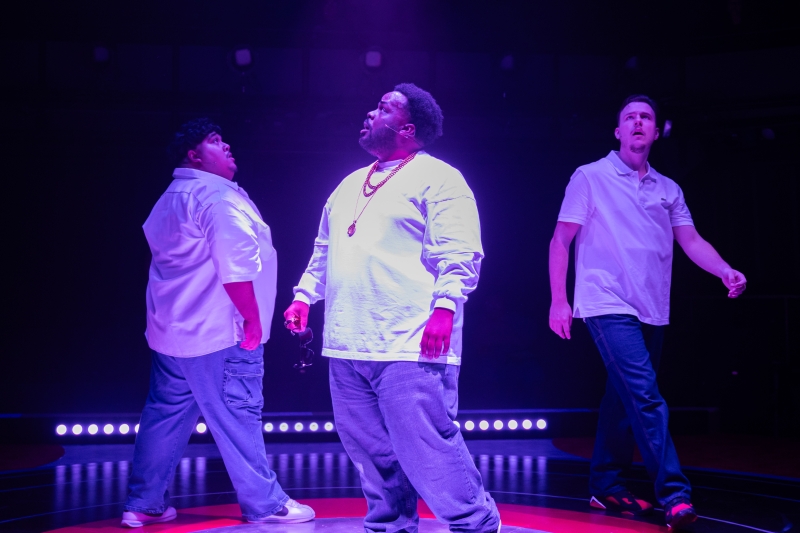
Issac Lopez,
Camryn Nunley as Othello,
and Gabriel Mullen
in Stages' Othello: The Remix
Photograph by Melissa Taylor
Despite my critiques of the show’s content itself, the performances are simply wonderful and the show is certainly a fun night out due to the catchy songs and exciting dance moves. Scenic designer Brandi Alexader did a fabulous job designing a stage that looks like a record. The stage also spun to add to the movement of the show, and it had red carpets to boot! Sound designer J. Salazar made the music so crisp, and the music direction completed by Emanuelee “Outspoken” Bean was clearly well-executed. The costumes designed by Macy Lyne were well-suited, and the props designed by Jodi Bobrovsky were also very clever, being brought on and offstage by storage cases on wheels. The choreography designed by Annelea Bootle was especially well done; the dance moves brought a lot of energy to the show. I also must give a special shout-out to lighting designer Janessa A. Harris and her assistant Destiny Smith; since the set was generally stagnant, the popping, spectacular lights added a lot of emotional color to the show that helped tell the story immensely.
I believe that everyone should watch the show, take in the exhilarating music and theatrical pictures, and see for themselves what they take away from the story. The show only runs until June 9th, so be sure to buy your tickets now!
Tickets to Othello: The Remix are now on sale and start at $42. Tickets can be purchased online (stageshouston.com) or by phone (713-537-0123.) Click here to buy your tickets now!
Reader Reviews
Videos

